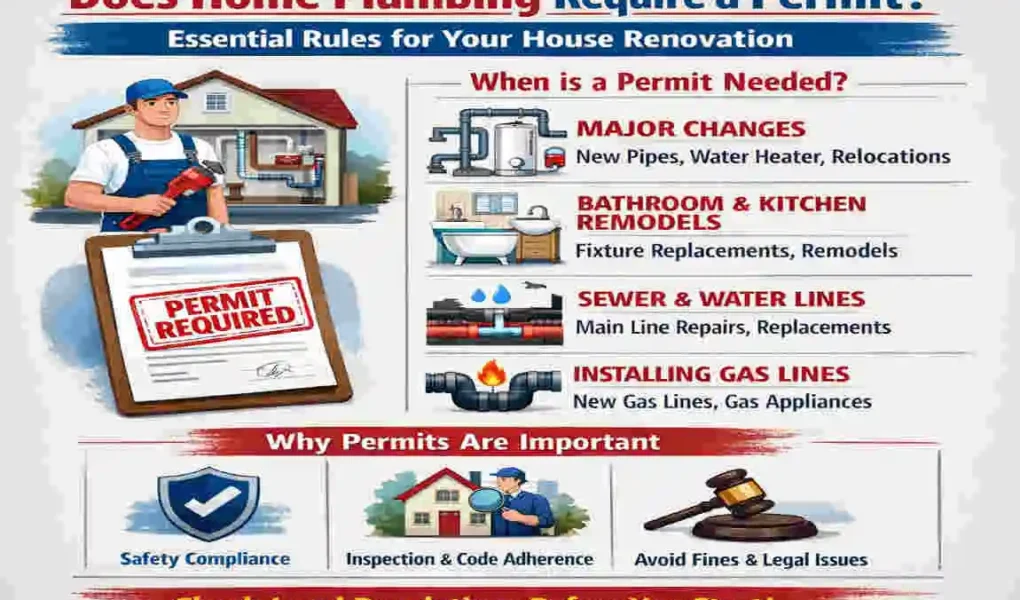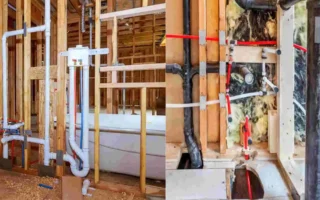You’ve spent weeks planning the perfect kitchen renovation. You’ve picked out the marble countertops, the farmhouse sink, and the high-end brass fixtures. You hire a local handyperson to move a few pipes, and the project looks great. But then, a year later, you decide to sell your home. The home inspector takes one look at the plumbing and asks for the permit. You don’t have one. Suddenly, you’re facing a $5,000 fine, a “stop work” order on your own home, and you’re forced to tear out that beautiful marble just to show the city that the pipes underneath are up to code.
What Is a Plumbing Permit and Why Does It Exist?
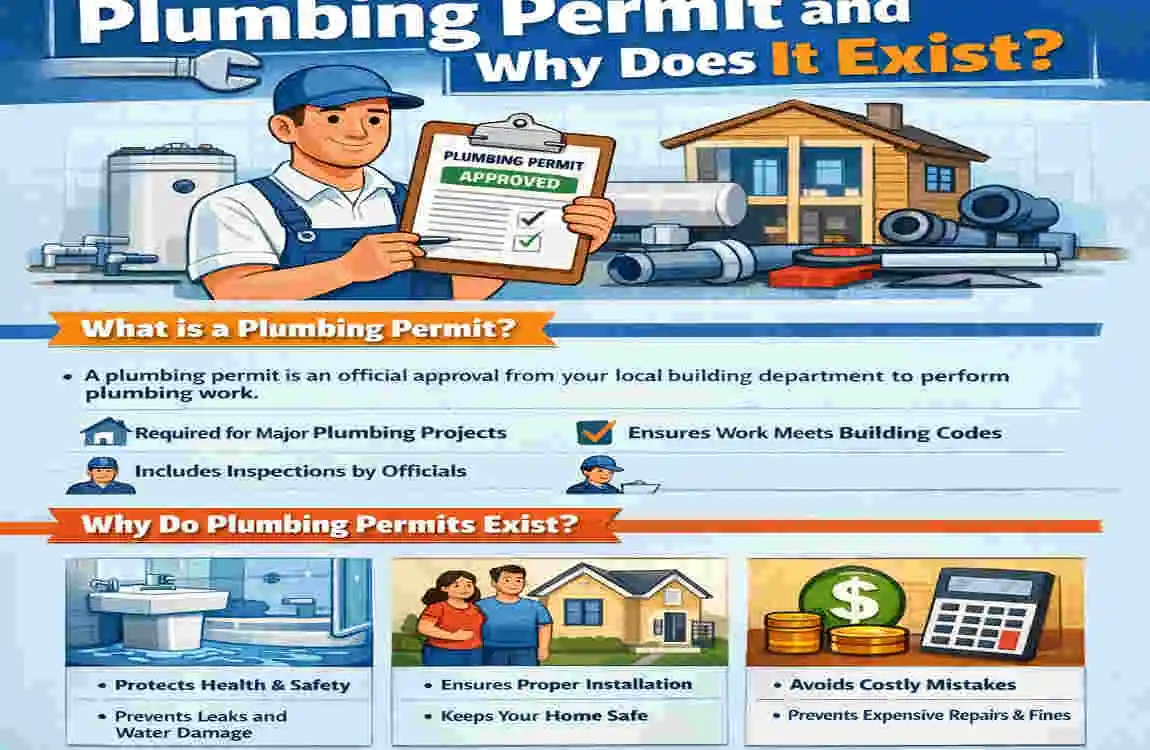
Before we get into the “when,” let’s talk about the “what.” A plumbing permit is an official authorization issued by your local government—usually the building department or the county. It gives you (or your contractor) the legal right to perform specific plumbing work on your property.
Think of it as a safety net. It’s not just a way for the city to collect fees; it’s a system designed to ensure that work done in your home complies with the International Plumbing Code (IPC) or the Uniform Plumbing Code (UPC).
Protecting Your Health and Safety
The primary reason permits exist is safety. Plumbing isn’t just about water coming out of a tap; it’s about managing high pressure, preventing toxic sewer gases from entering your living space, and ensuring your drinking water isn’t contaminated by “backflow.”
Without a permit and a subsequent inspection, there is no guarantee that the venting system is right or that the pipes are sized correctly. A small mistake in a gas line or a water heater installation can lead to fires, explosions, or carbon monoxide poisoning.
Safeguarding Your Property Value
When you pull a permit, you are creating a legal paper trail. This trail proves to future buyers and insurance companies that your home was renovated according to professional standards.
If you ever try to sell your house, the buyer’s title company or home inspector will often check for unpermitted work. If they find it, it can kill the deal or force you to lower your price significantly to cover the cost of “curing” the violation.
Ensuring Insurance Coverage
This is a point many homeowners miss. If you have a significant leak or a flood caused by unpermitted plumbing work, your homeowners insurance company may have the right to deny your claim. They view unpermitted work as a “voluntary risk” that you took, and they aren’t keen on paying for mistakes that didn’t follow the law.
When Does Home Plumbing Require a Permit?
Knowing exactly when to call the city can be confusing. Rules vary slightly depending on where you live, but there are some universal standards across the United States and Canada. Generally, if you are altering the footprint of your plumbing system, you need a permit.
Major Renovations and New Installations
Any time you are adding something new that wasn’t there before, you need a permit. This includes:
- Adding a New Bathroom: Since this involves running new supply lines and drain-waste-vent (DWV) lines, it is a significant project.
- Kitchen Remodels: If you are moving the sink to a kitchen island or adding a dishwasher where there wasn’t one, you are changing the system’s layout.
- Sewer Line Replacement: Any work involving the main line that connects your house to the city sewer or a septic tank requires strict oversight.
Replacing Major Appliances
You might be surprised to learn that water heater replacements almost always require a permit. Because water heaters involve high pressure and either gas lines or high-voltage electricity, the city wants to ensure they are correctly vented and strapped (for earthquakes).
Relocating Existing Fixtures
If you aren’t adding a new sink but you are moving the old one three feet to the left, you are still “altering” the piping. This usually triggers a permit requirement because the slope of the drain pipe and the vent location must be adjusted to work in the new spot.
When You Probably Don’t Need a Permit
For the more minor stuff, you can skip the paperwork. These are often called “ordinary repairs.”
- Replacing a Faucet: If you’re swapping an old faucet for a shiny new one using the existing shut-off valves, no permit is needed.
- Fixing a Leak: Patching a small hole in a pipe or tightening a joint is standard maintenance.
- Unclogging Drains: Using a plunger or a drain snake to clear a clog is perfectly legal to do without a permit.
- Replacing a Toilet: As long as you aren’t moving the “closet flange” (the hole in the floor), swapping the porcelain throne is usually fine.
Permit Requirement Table
To make it easier, here is a quick reference table for common house renovation projects:
Project TypePermit Required?Complexity Level
Water Heater Swap Yes Moderate
Faucet Replacement No Low
New Bathroom Addition Yes High
Moving a Kitchen Sink Yes Moderate
Repairing a Small Leak No Low
Sewer Line Repair Yes High
Replacing a Dishwasher No (Usually) Low
Installing a Sump Pump Yes Moderate
Local Variations in Plumbing Permit Rules
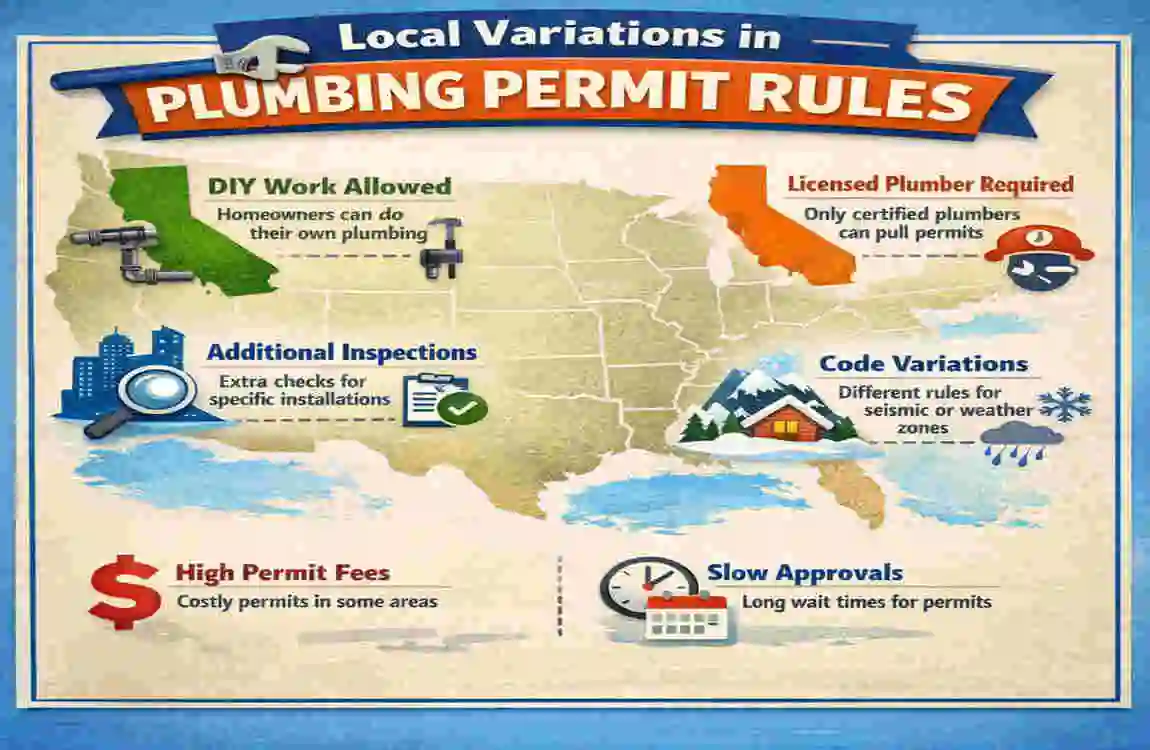
While we can give you general guidelines, the final word always comes from your local building department. Plumbing codes can vary widely depending on your climate and geography.
Urban vs. Rural Rules
If you live in a major city like Jacksonville, Florida, or Chicago, the rules are often much stricter. In these areas, the density of housing means a plumbing mistake in your unit could affect your neighbors or the city’s main water supply. In more rural areas, the “authority having jurisdiction” (AHJ) might be the county, and they might be more relaxed about specific types of residential work—though you should never assume this!
Regional Climate Codes
In colder climates, codes are particular about where pipes can be placed (e.g., never in an exterior wall) to prevent freezing. In earthquake-prone areas like California, permits are strictly required for water heaters to ensure they are properly strapped to the wall studs.
How to Check Your Local Rules
Don’t guess! Here is how you can find out for sure:
- Visit the City Website: Most building departments have a “Permit Guide” or a list of “Work Exempt from Permits” online.
- Call the Building Inspector: They are usually happy to answer questions. It’s better to ask now than to be caught later.
- Ask a Licensed Plumber: Local pros know the local codes like the back of their hand.
DIY Plumbing: Can Homeowners Pull Their Own Permits?
A common question we hear is, “Can I do the work myself, or do I have to hire a pro to get the permit?”
The answer is: It depends on where you live and if you live in the house.
The “Homeowner’s Privilege”
In many jurisdictions, there is a “homeowner’s exception.” This allows you to pull a permit for your own primary residence (the home you live in). The logic is that you have a vested interest in the safety of your own home. However, you are still held to the same professional code of conduct. You will still have to pass the same inspections.
When You CANNOT Pull a DIY Permit
- Rental Properties: If you own a house and rent it out, most cities require a licensed master plumber to pull the permit and perform the work. This is to protect tenants who don’t control the home’s maintenance.
- Commercial Buildings: If you own a small shop or office, DIY plumbing is rarely allowed.
- Gas Lines: In some strict areas, only licensed professionals are allowed to touch gas lines, even if you own the home.
The Risks of DIY Without a Permit
If you decide to go the DIY route and skip the permit, you are taking a massive gamble. Beyond the fines, you might find that you’ve installed something incorrectly—like a “S-trap” instead of a “P-trap”—which can allow sewer gas to leak into your home. This gas isn’t just smelly; it can be dangerous to your health over time.
A Step-by-Step Guide to Getting a Plumbing Permit
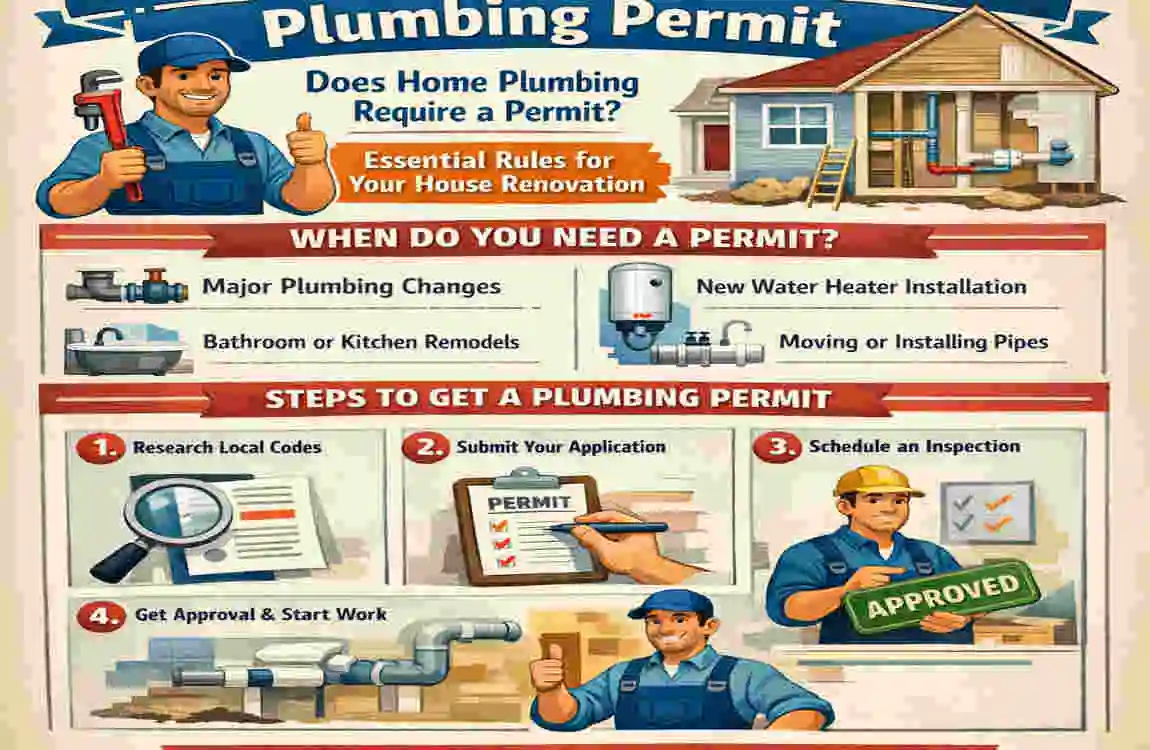
If you’ve determined that your project needs a permit, don’t panic. The process is usually straightforward if you follow these steps.
Research and Preparation
Before you head to the city office, you need a plan. For a simple water heater, you might need the model number and your address. For a bathroom addition, you will likely need a plumbing schematic or a “riser diagram.” This drawing shows where the pipes go, their sizes, and how they are vented.
Submit the Application
You will fill out a form detailing the scope of the work. You’ll list the number of “fixtures” (sinks, toilets, etc.) you are adding or moving. Most cities now allow you to do this online.
Pay the Fees
Permits aren’t free, unfortunately. The cost usually depends on the size of the project. A simple license might be $50 to $100, while a complete house renovation could cost several hundred dollars.
The “Rough-In” Inspection
Once you’ve installed the pipes but before you close up the walls with drywall, you must call for a “rough-in” inspection. The inspector will come out to check that the pipes are at the right angle (slope), that the joints are sealed, and that the system can hold pressure. They might ask you to fill the pipes with water or air to prove there are no leaks.
The Final Inspection
After the walls are closed, the tile is laid, and the faucets are actually installed, you call for the final inspection. The inspector will check that everything is working, that there are no leaks under the sinks, and that the fixtures are correctly secured.
Average Permit Costs and Timelines
Project Scope Avg. Permit Fee Inspection Count Timeline
Water Heater $75 – $150 1 1-2 Days
Kitchen Remodel $200 – $400 2 1-2 Weeks
Complete Bath Addition $300 – $600 2-3 2-4 Weeks
Main Sewer Line $400 – $800 2 1 Week
The Consequences of Skipping Permits
It’s tempting to try and save a few hundred dollars by skipping the permit process. You might think, “Who’s going to know?” But the risks far outweigh the rewards.
Legal and Financial Penalties
If a neighbor reports construction noise and a city official stops by, they can issue a Stop Work Order. This halts your project immediately. You will likely have to pay double or triple the original permit fee as a penalty. In some cases, the city can even place a lien on your property until the work is permitted and inspected.
The “Tear-Out” Nightmare
This is the worst-case scenario. If you’ve already finished your beautiful new bathroom and the inspector comes by, they have the legal authority to require you to tear out the drywall and tile so they can see the pipes behind it. They cannot “approve” what they cannot see.
Safety Hazards
We can’t stress this enough: plumbing codes aren’t just red tape. They are based on physics and health science.
- Cross-connections can lead to “gray water” mixing with your drinking water.
- Improper venting can cause “trap siphonage,” allowing methane gas to enter your bedroom.
- Poorly joined pipes can lead to slow leaks inside walls, which can cause black mold long before you see a puddle.
Cost Breakdown and How to Save Money
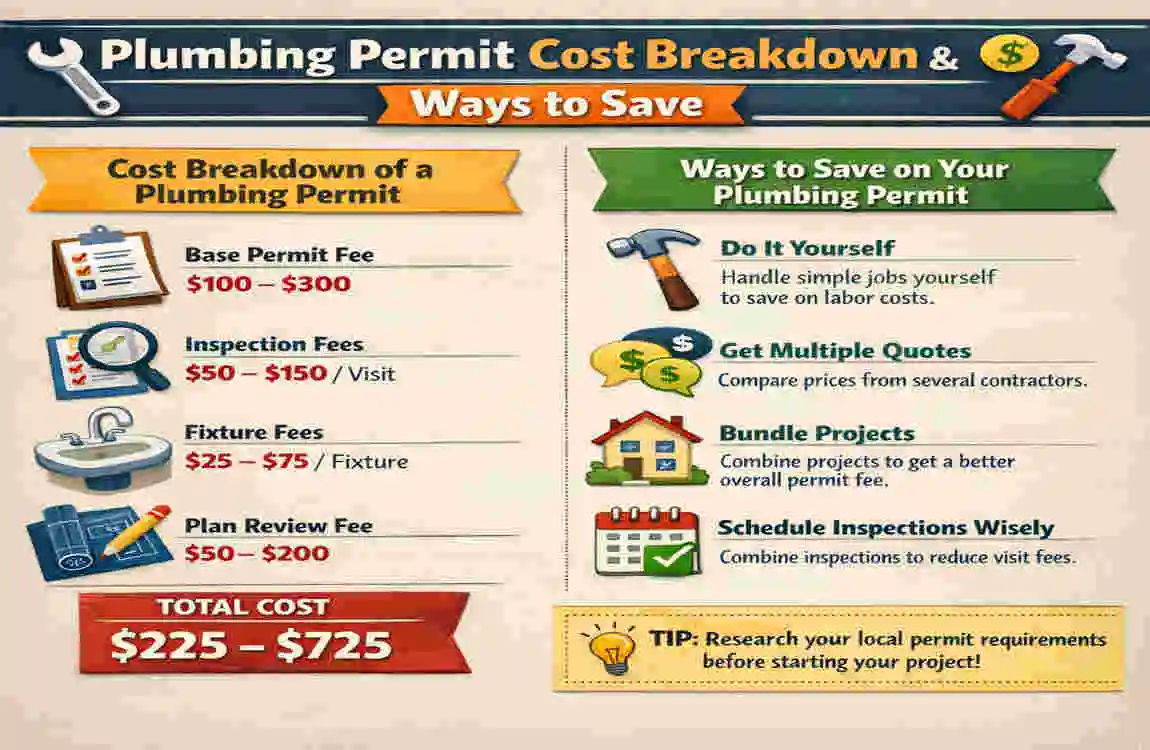
While permits add to your budget, they are a small price to pay for peace of mind. Here is how the costs usually break down:
- Administrative Fees: A flat fee for processing the paperwork.
- Fixture Fees: A “per-sink” or “per-toilet” charge.
- Inspection Fees: Usually included in the permit cost, but you might have to pay extra if you fail the first inspection and need a “re-visit.”
Tips to Save on Your Renovation
- Bundle Your Permits: If you are doing electrical, plumbing, and structural work, apply for a “Master Permit” or a “Combination Permit.” This is often cheaper than buying three separate ones.
- Hire a Licensed Pro: While it costs more upfront, a licensed plumber usually includes the permit process in their quote. They know how to pass inspections the first time, saving you from costly rework.
- Do the Prep Work: If you are DIYing, make sure your drawings are ready and your pipes are labeled. The faster the inspector can do their job, the smoother things go.
Frequently Asked Questions (FAQs)
Does home plumbing require a permit for a straightforward sink swap?
No. If you are replacing an existing sink with a new one in the exact location and not changing the pipes behind the wall, you generally do not need a permit.
What if I’m renovating my kitchen but not moving the appliances?
If you are changing cabinets and countertops and the plumbing stays exactly where it is, you likely don’t need a plumbing permit. However, you might need a general building permit for the cabinetry work.
How long does it take to get a plumbing permit approved?
For simple residential projects, many cities offer “over-the-counter” permits that are issued the same day. For larger renovations requiring plan reviews, it can take anywhere from one to four weeks.
Can I get a permit after the work is already done?
This is called a “retroactive permit.” It is possible, but it is much more expensive and stressful. You will likely have to open walls so the inspector can see the work.
Will my property taxes go up if I get a plumbing permit?
Generally, minor plumbing upgrades don’t trigger a property tax reassessment. However, adding a new bathroom increases your home’s square footage and value, which may result in a slight tax increase.

